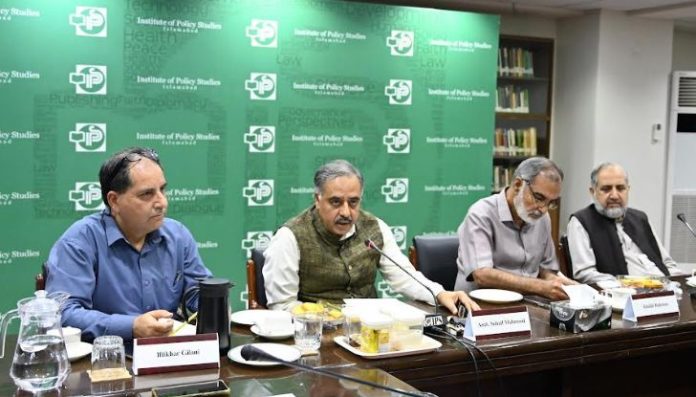The systematic study of India’s internal dynamics could enhance Pakistan’s advocacy for Kashmiris’ rights
Islamabad, OCT 27 /DNA/ – A deeper and more systematic understanding of India’s sociopolitical and cultural landscape, “Hindustan Sanashi“, is a prerequisite for shaping effective policies, as well as advocacy efforts for marginalized communities like Muslims in India and Indian Occupied Kashmir.
By broadening its scope to include serious academic study and curricular integration, and reaffirming the ideas surrounding Pakistan and Kashmir, a more comprehensive approach to regional issues can emerge. This expanded understanding should extend beyond media, entertainment, and major urban centers, offering hope and direction for future generations.
This was observed during the launching event of renowned journalist Iftikhar Gilani’s latest book ‘Ikkeeswi Sadi ka Bharat aur Musalman: Siyasat aur Samaaj kay Aeenay Mai’ (The 21st Century India and Muslims: Reflections in the Mirror of Politics and Society)” held by Institute of Policy Studies (IPS), Islamabad.
The book, published by IPS Press – the publishing arm of IPS, provides an in-depth exploration and record of the evolving dynamics between India’s Muslim minority and the state, and the impact of the Bharatiya Janata Party (BJP) and Rashtriya Swayamsevak Sangh (RSS) policies, which are reshaping India’s political and cultural identity with significant implications for Muslims and other minorities.
Chaired by Ambassador Sohail Mahmood, former foreign secretary and high commissioner to India, and director general, Institute of Strategic Studies, Islamabad (ISSI), the event featured remarks from Khalid Rahman, chairman IPS, and Ambassador (r) Syed Abrar Hussain, vice chairman IPS. The reviews of Prof Khurshid Ahmad, eminent scholar and patron-in-chief IPS, Raja Muhammad Zafar-ul-Haq, former senator and secretary-general Motamar Al-Alam Al-Islami, and Pakistan’s former high commissioner to India Ambassador (r) Abdul Basit were also presented on the occasion.
In his review, Prof Khurshid Ahmad emphasized the socio-political setbacks for Muslims and the decline of secular values in India, calling the book a crucial revelation of the harsh realities confronting the community.
Raja Zafar-ul-Haq emphasized the growing influence of Hindutva and the systemic marginalization of minorities, urging the need for Muslims to defend their identity and rights.
Ambassador Abdul Basit lauded the book’s thorough analysis of policy impacts over three decades, framing it as essential for understanding the ongoing struggle for Muslim rights in India.
Ambassador Sohail Mahmood emphasized that “Hindustan Shanasi” goes beyond academic curiosity; it is crucial for effective policymaking in Pakistan. He argued that a structured and deep study of India’s internal dynamics – addressing issues such as sectarianism, authoritarianism, and socioeconomic inequalities – can guide more informed decision-making. The speakers noted that understanding India’s sociopolitical landscape is vital for Pakistan, especially in advocating for the rights of Kashmiris and Muslims on international platforms.
The panel discussed the importance of reaffirming and promoting the “idea of Pakistan” alongside positioning Pakistan as a role model, championing the cause of Kashmir through a coherent narrative on Kashmir and Muslims and advocacy for Kashmir’s and Muslims rights at every international forum, based on a well-documented narrative of the region’s ideology, history, and struggles.
In this regard, documentation was considered a vital tool for strengthening the permanence and credibility of advocacy. The panel underscored the significance of compiling meaningful and contextual records of the challenges faced by Muslims in India, the struggle for Kashmir, and the evolution of Pakistan’s own identity is crucial for shaping policies and influencing international perspectives.
In his concluding remarks, Khalid Rahman said that ‘Ikkeeswi Sadi ka Bharat aur Musalman’ is not merely a compilation of articles but a meaningful documentation of the evolving relationship between the Indian state and the Muslim minority.
He further noted that much of the current discourse on India remains confined to media portrayals and major urban centers, failing to capture the complexities of India’s democracy, social structures, and shifting ideologies that, in turn, shape India’s governance, economic disparities, and the challenges faced by minority communities.

















